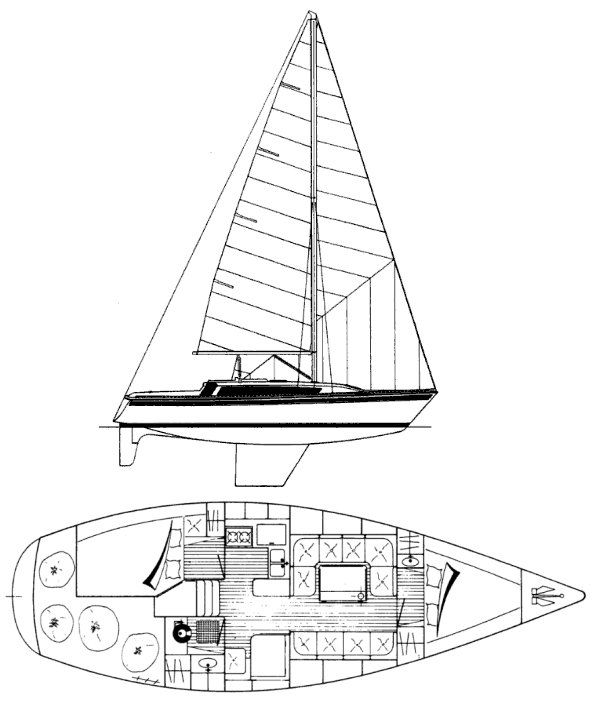The Gib'Sea 106 is a robust and capable cruising sailboat, designed for comfortable passage-making and family enjoyment. Introduced in 1984 by the respected French builder Gibert Marine, she embodies the company's ethos of creating practical, spacious, and well-performing yachts. With a length overall of just over 37 feet and a moderate displacement, the 106 was conceived by the notable French naval architects Michel Joubert and Bernard Nivelt to offer a balance of seaworthy characteristics and accessible sailing performance, making her a popular choice among both aspiring and experienced cruisers.
Gib'sea 106 Information, Review, Specs

- Make
- Gib'Sea
- Model
- 106
- Number Built
- Production Year(s)
- 1984 - ??
History and Design
The story of the Gib'Sea 106 begins in 1984, emerging from the Gibert Marine shipyard in Marans, France. Founded by Olivier Gibert, the company was known for producing fiberglass sailing yachts that prioritized comfort and practicality, qualities that strongly resonate in the 106. The collaboration with designers Michel Joubert and Bernard Nivelt, who contributed to many Gib'sea models, ensured a design that was both functional and aesthetically pleasing, aligning with the brand's reputation for robust construction and user-friendly characteristics that made their vessels popular, particularly in the charter trade.
During its production run, the Gib'Sea 106 offered some flexibility to owners. Notably, the vessel was available not only as the common sloop rig but also as a ketch version, providing options for sail plan management and performance. Furthermore, the hull could be fitted with either a fin keel or a keel/centerboard configuration, catering to different sailing depths and preferences. The "Master/Owners" version of the 106, frequently referenced, highlights its design intent as a substantial cruising platform.
Sailing Performance and Handling
The Gib'Sea 106 is well-regarded for its solid sailing performance and handling characteristics, particularly in challenging conditions. Owners frequently commend her seakeeping abilities and overall performance, especially when facing rough seas. This can be attributed to several design factors reflected in her calculated ratios.
With a Sail Area to Displacement (SA/D) ratio of approximately 18.39, the Gib'Sea 106 is classified as a relatively good performer, suggesting she can move efficiently in lighter winds while still maintaining control as the breeze builds. Her Ballast to Displacement ratio of around 35.3% indicates a reasonable degree of stiffness and stability, allowing her to stand up to a good amount of wind without excessive heeling. Furthermore, a Displacement to Length (D/L) ratio of roughly 176.6 places her in the lighter, more performance-oriented cruiser category, rather than a heavy-displacement traditional cruiser. This combination of ratios, along with her "big beamy" hull, contributes to a stable and seaworthy feel.
The boat is typically rigged as a masthead sloop, known for its simplicity and the ability to carry significant sail area. For ease of operation, all lines are typically led back to the cockpit, enhancing single-handed or short-handed sailing capabilities. While generally praised for its stability, some analyses suggest a lower righting capability if capsized in extreme scenarios, a characteristic often noted for lighter, beamier designs.
Accommodations and Layout
While specific headroom data is not consistently available, the Gib'Sea 106 is known for its spacious interior, a hallmark of Gib'sea designs. The layout is typically configured to maximize liveability and comfort for cruising. Descriptions often highlight a generous number of berths, sometimes citing up to ten, which would encompass salon settees convertible into berths in addition to dedicated sleeping cabins.
The interior generally features a traditional cruising arrangement with a V-berth forward, a main salon with settees and a central table, a functional galley, and a navigation station. A head compartment is typically located forward or amidships. The finish quality is generally considered practical and robust, often featuring a blend of wood trim and fiberglass elements, reflecting the construction standards of the era. Good ventilation and ample storage are usually priorities in such cruising designs, making the Gib'Sea 106 suitable for extended periods on board.
Owner's Perspectives
Owners of the Gib'Sea 106 consistently praise the boat's excellent seakeeping abilities and solid performance, especially in more challenging conditions. They appreciate its robust construction, which contributes to a feeling of security offshore. Many describe the 106 as a "fundamentally sound" vessel, capable of enduring many years of sailing. The boat's "big beamy" design is often cited as a contributor to both interior volume and stable motion. While some older models may require cosmetic attention or general maintenance typical of boats of their age, the core build quality and sailing characteristics remain strong points that appeal to those seeking a reliable and comfortable cruising platform.
Measurements
Construction & Hull
- Construction Material
- Fiberglass (Solid)
- Hull Type
- Monohull Sailboat
- Keel Type
- Fin
- Rudder
- 1x Skeg-Hung
- Ballast
- 3750 lbs (Iron)
- Displacement
- 10600 lbs
- Water Capacity
- 80 gal
- Fuel Capacity
- 40 gal
Engine
- Engine Make
- —
- Engine Model
- —
- Engine Type
- —
- Engine HP
- 28
- Engine Count
- 1
- Drive Type
- —
- Fuel Type
- Diesel
Rig & Sails
- Rig Type
- Masthead Sloop
- P (Main Luff)
- 42 ft
- E (Main Foot)
- 12.5 ft
- I (Foretriangle Height)
- 44.9 ft
- J (Foretriangle Base)
- 13 ft
- Forestay Length (est)
- 46.74 ft
- Main Sail Area
- 262.5 sqft
- Foretriangle Sail Area
- 291.85 sqft
- Total Sail Area (Reported)
- 554 sqft
- Total Sail Area (Calc)
- 554.35 sqft
Dimensions
- LOA
- 37.08 ft
- LWL
- 29.92 ft
- Beam
- 11.83 ft
- Draft
- 5.92 ft
- Max Headroom
- -
- Air Draft
- 45.67 ft
Calculations
- Hull Speed
- 7.33 kn
- Pounds per Inch Immersion
- 1